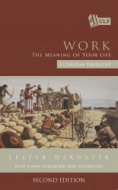Amid the threat of a “double-dip” recession, and the ongoing plight of joblessness across America, this Labor Day is bittersweet for many. For those who have the gift of employment, the right to work can seem more like a privilege. And for those looking for work, the hope of being hired soon can sometimes seem more like a fantasy. But it is precisely in this kind of challenging economic environment that we can most clearly see the blessing that work is both to ourselves and to one another.
For ourselves, work helps give life meaning and purpose. Human beings are naturally productive, tending, when unimpeded, to use our minds and hands to make things, to be creative. The very term “manufacturing” comes from root words that mean “making by hand.” Indeed, God has set up the world in such a way that work is a blessing, the way he provides for us to provide for ourselves and our families. The German theologian Dietrich Bonhoeffer in this context called work God’s “order of grace,” the regular means he has given to take care of our material needs. Anyone who has been out of work knows this to be true: having a job and receiving a paycheck is a great blessing. [Read more…]

